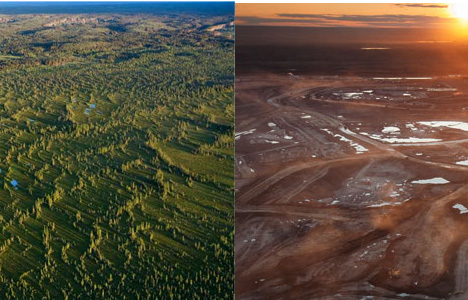
Don’t Believe in Tar Sands Magic Fairies
One of Canada’s most famous scientists has launched a scathing attack on the country’s politicians, claiming that labelling the tar sands as environmentally harmless is “lies”.
One of Canada’s most famous scientists has launched a scathing attack on the country’s politicians, claiming that labelling the tar sands as environmentally harmless is “lies”.
Professor David Schindler, a freshwater ecologist from the University of Alberta, is an expert on pollutants ranging from phosphates to acid rain and toxic waste.
He is also the past recipient of the prestigious Gerhard Herzberg Canada Gold Medal, which is given to Canada’s top scientist.
Speaking at Carleton University late last week he said that political leaders in Alberta and Ottawa “seem to think that Americans believe in magic fairies — just shut your eyes and say the oil sands are clean four times and it happens.”
Schindler labelled the PR campaign by the oil industry surrounding the tar sands a “sham”. He continued by asking “Why are people allowed to lie to the public like this? I just don’t understand this. We have to challenge them. Obviously the people who used to challenge them, the civil servants, are no longer allowed to.”
Schindler called the tailings ponds in the region, which cover some 170 square kilometres a “a toxic Great Lake.”
He added: “It gives you an indication of how stupid this must seem to people in Washington. They must think we’ve all just fallen off a turnip truck … We’ve had premiers and prime ministers and ministers of the environment spouting this stuff.”
It was Schindler’s research that revealed that snow samples in the Athabasca River valley contained more toxins near the tar sands compared to clean snow upstream.
A few years ago, Schindler filled “half a freezer full” of fish with deformities and skin lesions out of the Athabasca River. Scientists have been finding fish with the same kind of lesions in the wake of BP’s Deepwater Horizon spill, something I blogged about yesterday.
Schindler’s broadside came as Canada’s politicians continued to spout the tar sands fairy nonsense. Alberta Premier Alison Redford, her Environment minister, Diana McQueen, and federal Environment Minister Peter Kent were all in Washington, to promote the Keystone XL pipeline and tar sands generally in the latest lobby push.
Canadian officials have also been lobbying against efforts to block tar sands crude exports from passing through the New England states of Vermont and Maine. This is being seen as a sign that the industry and Canadian government hope to one day send oil east of Alberta for export through the United States as well. Canadian officials believe that some 600,000 barrels a day could be exported between Montreal and Maine.
Representatives from Canada’s New England consulate in Boston have been lobbying hard trying to allay people’s concerns over using pipeline infrastructure in Vermont, Maine and New Hampshire to import the tar sands.
Recently, Patrick Binns, Canada’s consul general to New England and a former Progressive Conservative premier of Prince Edward Island appeared at a meeting in Maine to defend the transportation of tar sands. “I want to assure you that Canada and Alberta are committed to being environmentally responsible,” said Binns.
He also wanted to assure his audience that it was OK to believe in the tar sands magic fairy, like he did.

